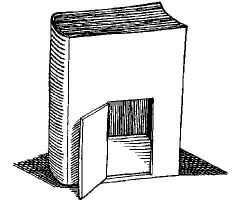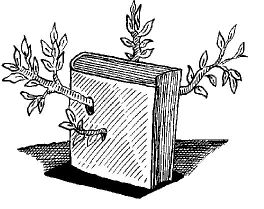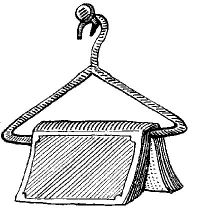The Book of Lost Books (40 page)


Ernest Hemingway
{1899â1961}
IF THERE WERE a prize for the most accident-prone author, Ernest Hemingway would have won it before he received either the Pulitzer or the Nobel. He broke bones in several car crashes, escaped from one plane crash, contracted anthrax, was grazed by several bullets and on occasion actually shot, cut his eyeball, suffered congestion of the kidneys and liver problems, pulled a skylight down on himself, and endured countless bashes, scrapes, knocks, collapses, and tumbles.
One accident, however, rendered even this most macho of authors speechless. In 1922, Hadley Hemingway (the first of his four wives) was traveling to Switzerland with her husband's effects. At the time, Ernest had written much, but very little had been published. He had managed “six perfect sentences,” and was already well advanced in a novel about his experiences in the First World War. Among the valises and trunks Hadley was transporting was a case with everything Ernest had written to date. Somehow, it was stolen.
He had been developing a theory that even if something was edited out of a work of art, its trace would linger. Now he had to face the full ramifications, the reductio ad absurdum, of this idea. The fact that both Ezra Pound and Gertrude Stein had told him to ditch everything he had written and start again must have been little comfort. Every author produces juvenilia. Most destroy it. The theft of Hemingway's manuscripts short-circuited the whole process. Had he spent the next ten years trying to perfect his immature jottings, we might never have seen the novels of which he was capable.
The image of Hemingwayâ“Papa,” the boxer, fisher, hunter, brawlerâalmost eradicates the fresh-faced, unpublished, and nervous boy of 1922. Of course, he harbored the germs of his combative persona: apropos of the death of Joseph Conrad, two years later, Hemingway wrote in
Transatlantic Review
that if “by grinding Mr. [T. S.] Eliot into a fine dry powder and sprinkling that powder over Conrad's grave” he might resurrect the novelist, then “early tomorrow morning with a sausage-grinder” he would leave for London. But the bullish façade was still under construction, not yet concrete. The day after Hadley, distraught, arrived without a significant piece of luggage, Hemingway traveled to confirm that everythingâevery sheaf, notebook, and carbon copyâwas truly gone. They were.
“I remember what I did in the night after I let myself into the flat and found it was true,” he wrote, but never revealed whether rage, or booze, or even tears were his response. Despite his fame as a crack shot and tenacious angler, what grizzled Old Hem really felt about the books that got away is unknownâthough he later claimed he would have opted for surgery if it might remove the memory of the loss. His motto
âil faut
(
d'abord
)
durerâ
one must (above all) endureâwas tested as much by pen and ink as on the savannah and the open seas.

Dylan Marlais Thomas
{1914â1953}
IF NOTHING ELSE, Dylan Thomas is most people's idea of a modern poet. He is the hybrid of celebrity and poverty, swanning around in New York and schlepping about in Swansea, a potbellied genius and an evangelical boozer, with a permanent cigarette at a chipper angle in the corner of his mouth. Honey-tongued and beery-breathed, he is heading for the grave and immortality. What's more, his poetry is supposedly incomprehensible. The critic Kenneth Hopkins referred to the battle between “the scoffers and the understanders,” and academics challenged their students to discern meanings in the one-night stands between words. What did “a grief ago” or “flowered anchor” actually signify?
Thomas was allergic to the notion that his poetry was meaningless. He hated Surrealism, and joked that in Hell, particular sinners (like the editor of
Verse
) will “for all eternity . . . read the cantos of Ezra Pound to a company of red-hot devils.” The poems are oblique, even cryptic, but they are not inchoate blathering. Riddles have solutions, ciphers can be decoded: as he said to his publishers, “every line
is
meant to be understood.” The poems had their
veritas,
even though it sprang from, and might only be glimpsed again,
in vino.
How many good ideas did Thomas piss up against a wall? The BBC commissioned a translation of Ibsen's
Peer Gynt,
and Thomas's unreliability, strident demands for more money, and chaotic personal life ensured that we can never know what he would have made of that irrepressible, feckless, flamboyant failure. In July 1940, he assured Laurence Pollinger, who was standing in for his regular agent, David Higham, that his publishers would see a short novel,
Adventures in the
Skin Trade,
“quite soon”; in September 1953 he was telling E. F. Bozman of J. M. Dent publishers that he was “so glad” that they would reconsider the same book, and that “when I come back from America, I intend to settle down & finish it.” Thomas died in New York on November 9 of that year.
Given the intricacy and complexity of his poetic output, it is surprising that Thomas took so readily to radio broadcasting. He adapted to the necessary immediacy of the form, and one work he consequently produced,
Under Milk Wood,
remains his most popular, even though it was only performed on the stage before his death. The genesis of
Under Milk
Wood
is a peculiarly haphazard mishmash of abortive projects. It was not even, initially, imagined as “a play for voices.”
In March 1948, Thomas was pitching to the
Picture Post
that he would love to write an article about Laugharne, where he had settled briefly, and which he would return to as a permanent address the next year. During the course of his proposal, he mentioned, en passant, that he was writing a radio play set there. The project would variously be called
The
Town That Was Mad
and
Llareggub
(which, in typically Thomasy form, needs to be read backwards to get the joke).
Picture Post
declined to offer a commission, and another attempt to capture the cadences and accidents of rural Welsh life was postponed.
Ten years beforehand, Thomas had tried another tack. Writing to the aspiring poet Meurig Walters, he outlined a concept that he said he had sent to Keidrych Rhys, the editor of
Wales
magazine: a “mass-poem.” Based on the principles of mass observation, the notional poem “Wales” would involve all the contributors to the magazine writing a “verse-report of his own particular town, village or district”; and the resulting entries, by random arrangement rather than editorial decision, should make up a whole poem. Thomas was eager to solicit Walters as the Rhondda writer. However, no letter to Keidrych Rhys has ever surfaced, and it may be that Thomas, in true drink-sodden fashion, mistook a promise to himself to do something for the sense that he actually had.
Even once he was writing, and reading from
Under Milk Wood,
Thomas's propensities and fondnesses jeopardized the work's ever seeing the light of day. In 1953 he wrote to Charles Elliott, of University College, Cardiff, asking a favor:
Do you remember that I had with me a suitcase & a briefcase, & that I transferred, some time in the evening, some of the contents of the briefcase into the suitcase? Well, anyway, I left the briefcase somewhere. I
think
it must be in the Park Hotel. I've written to the manager; but could you possibly; when & if passing by, drop in & see if it is there? It's very urgent to me: the only copy in the world of that kind-of-a-play of mine, from which I read bits, is in that battered, strapless briefcase whose handle is tied together with string.
If the thing isn't there, do you think you
could
find out where the hell I left it?
It was indeed so urgent that, as Paul Ferris, the editor of Thomas's
Collected Letters,
notes, he managed to lose it again in America, and then again in London, where it was found in a pub. Luck, for once, was on Thomas's side. For all his attempts to misplace
Under Milk Wood,
it refused to be lost. What was lost, however, was the poet himself. The self-styled “Rimbaud of Cwmdonkin Drive” expired only three years older than his hero.

William Seward Burroughs
{1914â1997}
READING
NAKED LUNCH
is a disorienting experience. This is not solely because of its subjects: the drug-addled hallucination, the riddling sphincters, the paranoid intimations of impending disaster, the sexual degradation that unleashes psychic illumination; nor is it merely a product of the shifting tenses, coalescing characters, and outrageous imagery. The text itself trembles with a sense of instability, a monstrous capacity for paranormal mutation, as if, on finishing it, the reader might start again and find a wholly different book in his or her hands.
Naked Lunch
is an intoxicating, volatile volume.
Three different readers, one with a first edition from the Olympia Press in France, one with a U.S. edition, and the last with John Calder's U.K. edition, would find themselves embroiled in cross-purposes. Was it called
The Naked Lunch
or
Naked Lunch
or
Dead Fingers Talk
? Did everyone experience the fearful déjà vu of finding parts of the first paragraph also on page 170? When Allen Ginsberg, before the book had even been delivered to the publisher, referred to it as “an endless novel that will drive everyone mad,” he inadvertently described the experience of more than just a clutch of bibliographers trying to make sense of its publication history.
Myths cling to it like stains. Take the title. Burroughs once explained that
Naked Lunch
referred to a “frozen moment when everyone sees what's on the end of every fork,” a sickly epiphany when consumption and greed become evident. The first publisher, the genius, pornographer, and maverick Maurice Girodias, was told that it referred to the post-work, pre-dinner period for adulterous relationships, what the French refer to as the
cinq à sept.
Yet another explanation refers to Burroughs's first attempt at novel-writing, a detective story he and Jack Kerouac took turns penning, the still-unpublished
And the Hippos Were
Boiled in Their Tanks,
where, supposedly, Burroughs mistyped “naked lunch” for “naked lust.” Which story is true? In the chaotic, quantum-fractured Burroughsverse, all of them contain a grain, or gram, of truth.
The book evolved out of what Burroughs had cut from his previous works,
Junkie
and
Queer,
as well as the so-called
Yage Letters
he sent back from Mexico. Given his nomadic existence and manner of working, the fact that anything resembling a manuscript was finally assembled is nothing short of miraculous. Girodias recalled Burroughs in Paris as a “grey phantom of a man in his phantom gabardine and ancient discoloured phantom hat, all looking like his mouldy manuscript,” and insisted, against the testimony of Burroughs's friends, that the typescript had in part been eaten by rats.
Brion Gysin, Burroughs's collaborator, helped him move from London, organizing his twenty box-files, seventeen of which were marked “Miscellaneous.” Paul Bowles offers a manic glimpse of Burroughs at work in Tangiers: he would type, or, when the typewriter was sold to pay for drugs, write longhand, tossing each page onto the floor where a pile of papers, covered with footprints and burying sandwiches, festered like an archaeological midden, occasionally blowing out of the window.
When it was assembled, nowhere near his entire output was distilled into the various forms of
Naked Lunch.
The ur-text was possibly a thousand pages long. Some pages, according to Brion Gysin, were later being sold at a dollar a sheet by Algerian street boys, salvaged from a suitcase of papers that Burroughs had hastily abandoned. The primordial swamp of words that had evolved into
Naked Lunch
was not, however, spent effluvia. Burroughs developed, with Gysin, his “cut-up” technique, where the reams were torn, folded, and patched together to create new works. He believed that such ritualistic incisions could make the words reveal their true meaning: like a forensic shaman, he slaughtered and sacrificed quires and sheaves. The remnants were obliterated, reimagined, transformed, and edited into
The Soft Machine
and
The Ticket That Exploded.
“The fragmentary quality of my work is inherent,” Burroughs told Allen Ginsberg. The world was a wreck, shattered and splintered, yet full of hidden meanings and dark significances: squinting into the maelstrom might allow a man to realize that he was a sleeper, preprogrammed by occult espionage operatives, who could then escape from the tentacles of their influence. Everything was infected, except filth; everyone was hypocritical apart from the double agents. If you could focus on the undulating pattern of the blur, rather than attempt to clarify the mirage, you might glimpse a quality beyond disillusion.
If Burroughs were merely a writer of copious first drafts, his manuscripts would be a curiosity, and ample fodder for an eager graduate student. But his methodology creates a kaleidoscope of possible books, an infinite number of sequences, each of which could, hypothetically, have revealed a different story altogether. His published work exists purely by virtue of its attendant swarm of virtual books, winking into and vanishing back out of our particular dimension.